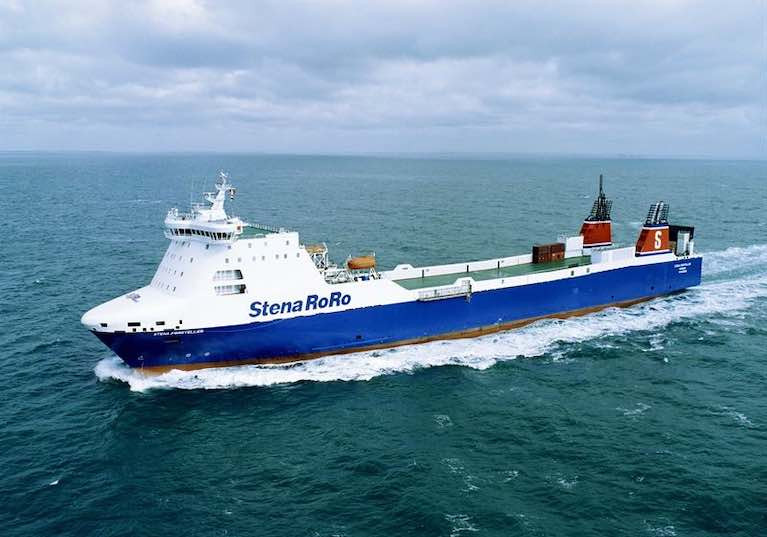The Stena Foreteller is to be redeployed on the direct route to the Continent following border closures between the UK and France.
As Afloat reported earlier, in light of recent international border closures which have seriously impacted freight flows, Stena Line has confirmed that it will bring forward the introduction of its Stena Foreteller ferry on the Rosslare-Cherbourg service to Tuesday 22nd December, ahead of its original date of 4th Jan.
The freight-only Stena Foreteller will join the Stena Horizon which already operates on the route, doubling the freight capacity as well as the frequency of sailings between Ireland and the Continent.
Stena Foreteller will provide an additional 3, 000 lane metres of freight capacity per trip and can accommodate a mix of accompanied and unaccompanied traffic with onboard facilities for up to 12 freight drivers.
Niclas Mårtensson, CEO Stena Line said: “The developments of the last few days in terms of border closures have put enormous strains on the logistics industry. Our Rosslare-Cherbourg service is the shortest direct crossing between Ireland and France, and I’m delighted to see that our operational team on the Irish Sea have been able to ‘fast-track’ the introduction of the Stena Foreteller, providing vital additional capacity in the run up to Christmas.”
“We have developed a reputation for keeping vital supply lines open for food and medical supplies throughout the Covid-19 pandemic, and once more we have shown our flexibility and expertise in being able to react swiftly to market demands. We are currently experiencing huge demand for our direct services to the Continent with our North Sea vessels (ex Killingholme and Harwich) being oversubscribed by a multiple of three.”
“From tomorrow (18:00 hrs ex Rosslare) we will provide 12 weekly crossings connecting Rosslare and Cherbourg and up to 240 sailings per week throughout the Irish Sea region, offering transport organisations and their customers the flexibility, availability and reliability they require at this time.”Glenn Carr, General Manager, Rosslare Europort said: “This is obviously a critical time for Irish industry, and as Port Authority, we are determined, working in partnership with Stena Line, to offer alternatives to those whose supply chains are impacted by the newly introduced restrictions to the landbridge. We welcome Stena Line’s response in quickly arranging additional capacity on the Rosslare Europort to Cherbourg route, and we will continue our efforts to respond effectively as COVID-19 measures impact Irish business.”
Stena Line is the largest ferry operator on the Irish Sea, with the biggest fleet offering the widest choice of routes including, combined passenger and freight services from Belfast to Cairnryan, Heysham and Liverpool, Dublin to Holyhead, Rosslare to Fishguard and the direct service from Rosslare to Cherbourg.































































